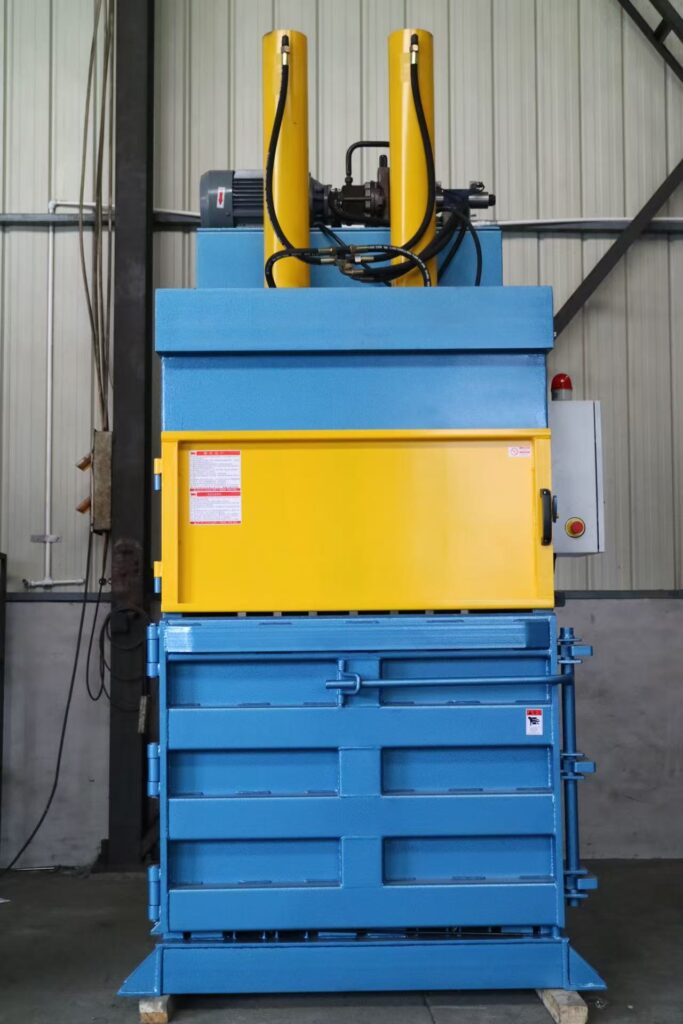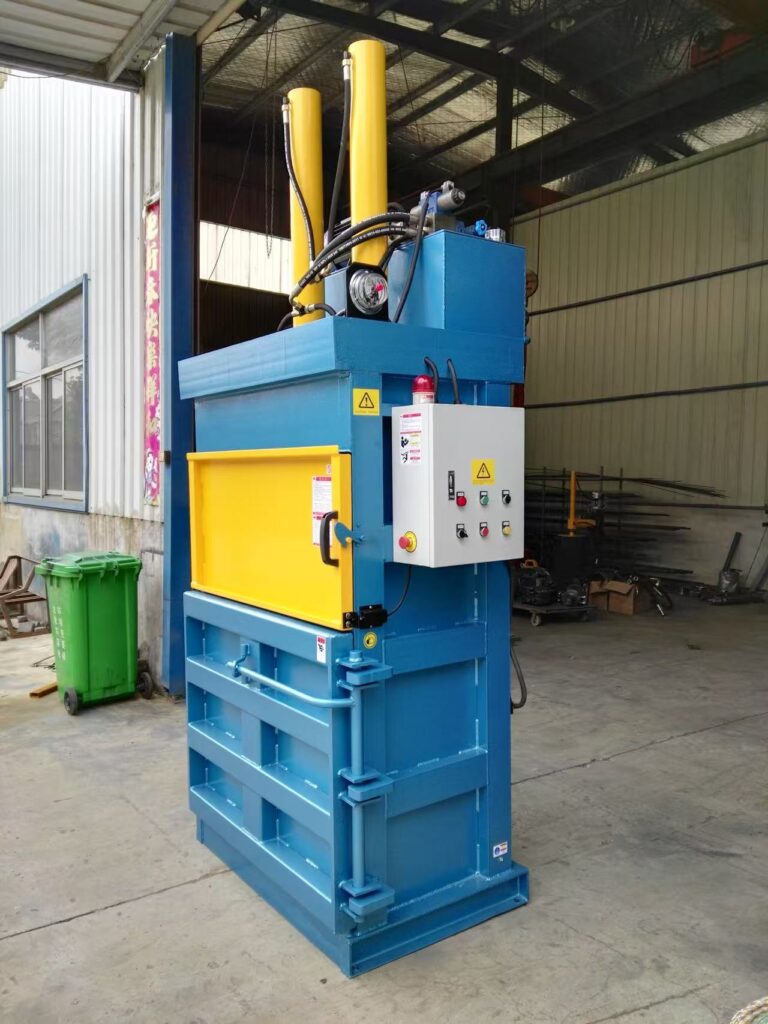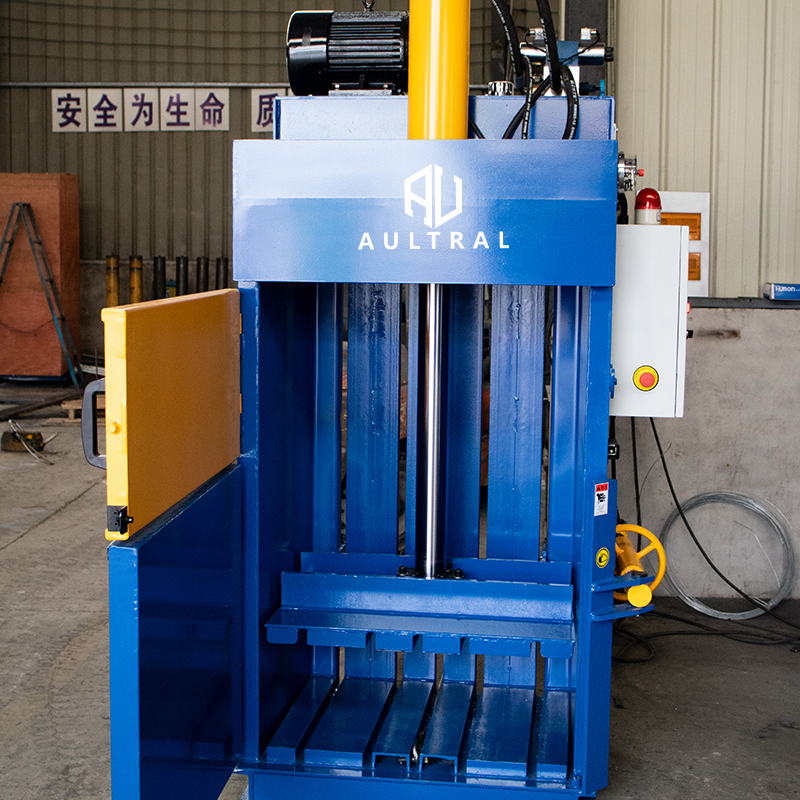What is a High-End Vertical Baler?

A high-end vertical baler is a powerful waste management machine designed to compact a wide range of recyclable materials, including cardboard, plastic bottles, textiles, aluminum cans, and more.
Unlike standard balers, high-end models are built with advanced features that deliver greater performance, durability, and automation. Typically powered by a hydraulic press system, the material is loaded from the front and compressed from the top down into dense, uniform bales.
What sets a high-end vertical baler apart is its premium engineering and smart design. Many models include:
-
Heavy-duty steel construction for long service life
-
Precision hydraulic cylinders for stronger compression
-
User-friendly control panels or touch-screen interfaces
-
Automatic bale ejection systems
-
Safety interlocks and sensors for operator protection
-
Energy-efficient operation
Some balers are also customizable, with options such as:
-
Rear ejection systems
-
Dual-cylinder configurations
-
Programmable logic controllers (PLC) for automated control
These machines are especially suitable for medium to large-scale operations, including recycling centers, warehouses, supermarkets, textile manufacturers, and production facilities. By combining space efficiency with industrial-grade performance, high-end vertical balers provide professional, scalable waste management solutions.
Why Use a High-End Vertical Baler?

Businesses choose high-end vertical balers because they offer a higher level of efficiency, safety, and long-term value compared to standard models.
Key Benefits include:
-
Denser, Higher-Quality Bales – Greater compression force creates compact bales that save storage space, cut transport costs, and fetch better prices from recyclers.
-
Labor & Time Savings – Automation features such as auto-ejection, programmable cycles, and bale monitoring reduce manual handling and speed up operations.
-
Safety Enhancements – Equipped with advanced sensors, interlocks, and automatic stop functions to protect operators, especially in high-volume environments.
-
Durability & Lower Maintenance – Built from premium components to withstand heavy use while minimizing downtime and servicing costs.
-
Material Versatility – Capable of compacting not just cardboard and plastics, but also textiles, foam, and certain metals.
-
Sustainability Support – Helps companies meet recycling goals, comply with environmental regulations, and reduce landfill dependency.
For industries that generate large volumes of waste every day, a high-end vertical baler ensures cleanliness, workflow efficiency, and compliance—making it a smart investment for long-term savings and sustainability.
How to Use a High-End Vertical Baler?

Operating a high-end vertical baler is simple, but proper training and safety compliance are essential.
Step-by-step process:
-
Load the Material
-
Open the front door and place recyclables (cardboard, plastics, textiles, etc.) into the chamber.
-
Fill to the recommended level.
-
-
Start the Compression Cycle
-
Close the door securely.
-
Use the control panel or touch-screen interface to activate the hydraulic press.
-
The ram applies strong vertical pressure, compacting the material into a dense bale.
-
-
Secure the Bale
-
Insert binding wire or straps through designated slots to hold the bale together.
-
Some advanced models automate this step.
-
-
Eject the Bale
-
Depending on the machine, eject the bale manually, semi-automatically, or fully automatically.
-
-
Routine Maintenance
-
Clean out debris after use.
-
Check hydraulic oil levels and seals.
-
Inspect compaction surfaces regularly.
-
Follow the manufacturer’s maintenance schedule for maximum lifespan.
-
📌 Safety Tip: Operators should always wear protective gear, never bypass safety systems, and complete proper training. Many suppliers provide setup support, training videos, and safety guidelines to make adoption easy.
In Summary:
A high-end vertical baler is more than just a recycling machine—it’s a professional-grade waste management solution. With stronger compression, automation features, and a durable build, it helps businesses cut costs, improve efficiency, and meet sustainability goals, all while maintaining a cleaner, safer workplace.
